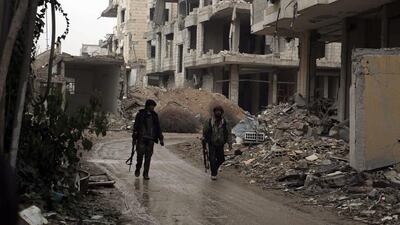The imminent battle to dislodge ISIL from Raqqa can deliver many things. It can be a deadly blow to ISIL in a country where it has little experience – relative to Iraq where it originated. It can be the beginning of a process to steer much of the country in a new direction. Or it can merely reset the conditions for a more chaotic north where ISIL will still be a player and other jihadist organisations will return.
The most significant battle against ISIL in Syria is muddled by the conflict between Turkey and the Kurdish militias in northern Syria. Both the United States and Turkey exerted little effort over the past two and a half years to adequately prepare for this battle. As the battle approaches, the two find themselves stuck with the forces they perceive as better positioned to do the job, when neither choice is appropriate for such an important battle.
The US had an Iraq-first strategy for the best part of the Operation Inherent Resolve, while it relied on the YPG, the Kurdish People’s Protection Units, to fight in Syria. Whereas the international coalition prepared well for Mosul and ensured that Kurdish and Shia militias do not fight in the city, the same has not been done in Syria. Kurdish militias appear primed to spearhead the fight in Raqqa.
If Washington has deemed it a bad idea for Iraqi Kurdish and Shia militias to fight in Mosul, why should it be a good idea for the Kurdish militias to lead the fight in Raqqa? The answer is clear: Washington recognises the social, ethnic and political implications of having Kurdish militias lead the Raqqa battle, considering its opposition to the same in Mosul, but it wants a tactical win against ISIL. It is that simple.
The US government should rethink the Obama administration’s misguided and imprudent approach if it is to defeat ISIL properly. Policymakers reviewing the strategy today should resist the temptation of making a choice based on what few good options the existing approach has produced. Policymakers should also not be deceived by the fact that many seem willing to work under the canopy of the YPG-dominated Syrian Democratic Forces despite the fears. Many others are joining forces with the regime, but none of these trends should drive policy.
Some may argue that locals hate ISIL more than any other force and that the YPG will leave Raqqa after liberation. Those people should consider two key complications, among many.
People in Raqqa, as elsewhere in eastern Syria, see Tal Abyad as an ominous precedent, where the Kurdish militias mistreated locals, expelled others and controlled a largely Arab area. While politicians may promise this will not happen, existing perceptions of the Kurds mean the battle will be a case of “let’s expel ISIL and deal with the consequences later”.
The second issue is how the YPG and its allies determine who is an ISIL member. This is a serious issue even in Iraq, where there is a relatively functioning state system to deal with the interrogation process. In Mosul, whole families were reportedly rounded up by formal army officers for interrogation for days because a relative was accused of being an ISIL member. Kurdish militants are more at ease with accusing locals living under ISIL of being fellow travellers, and locals know it.
The perception of a hostile militia in the lead complicates this issue. For example, if a former government technician continued to work in a certain sector, either because ISIL pressured him or because he saw his work as service to the city, will the militias kill him on the grounds that he was an ISIL member? If such a person is killed by militias operating under the YPG’s command, the act will be perceived through an ethnic and political lens.
The problems associated with the type of militias that will be fighting inside Raqqa should be taken seriously. Raqqa can be much more than a tactical victory against ISIL. It can be a way for the United States to make the win the start of a new chapter in the Syrian conflict.
Instead of rushing into Raqqa with a group viewed suspiciously by both locals and Turkey, a Nato ally, the US should use Raqqa as a mobilising battle to create an acceptable formula that reduces tensions in northern Syria.
This formula should involve enabling the rebels to fight ISIL in Raqqa and eastern Syria. It should also involve balanced political and military cooperation between Arabs and Kurds. Such cooperation should not be based on Kurdish dominance. This formula can also be tied to the idea of safe zones that the American president, Donald Trump, has repeatedly promised in Syria.
In 2012, fighting against the YPG was invigorating to so many anti-regime forces in eastern and northern Syria. The rebels say the YPG "stabbed them in the back" by fighting them as they began to storm regime bases in that region.
Al Qaeda, which ISIL uprooted from eastern Syria in 2014, will undoubtedly use grievances against the Kurdish militias to mobilise locals and fill the vacuum after ISIL is expelled from its areas. Indeed, Al Qaeda’s plan to roll back into eastern Syria is already under way, according to senior jihadist sources inside the country.
A balanced approach in northern Syria, where the US has leverage, should consider all the fault lines in northern Syria and help turn that region, which constitutes around 50 per cent of Syria, into de facto safe areas that reduce the bloodshed and prevent the return of jihadists.
Reliance on the YPG is as wrong in Raqqa as the entry of Shia and Kurdish militias in Mosul that the US opposed.
Hassan Hassan is a senior fellow at the Tahrir Institute for Middle East Policy and co-author of ISIS: Inside the Army of Terror
On Twitter: @hxhassan

